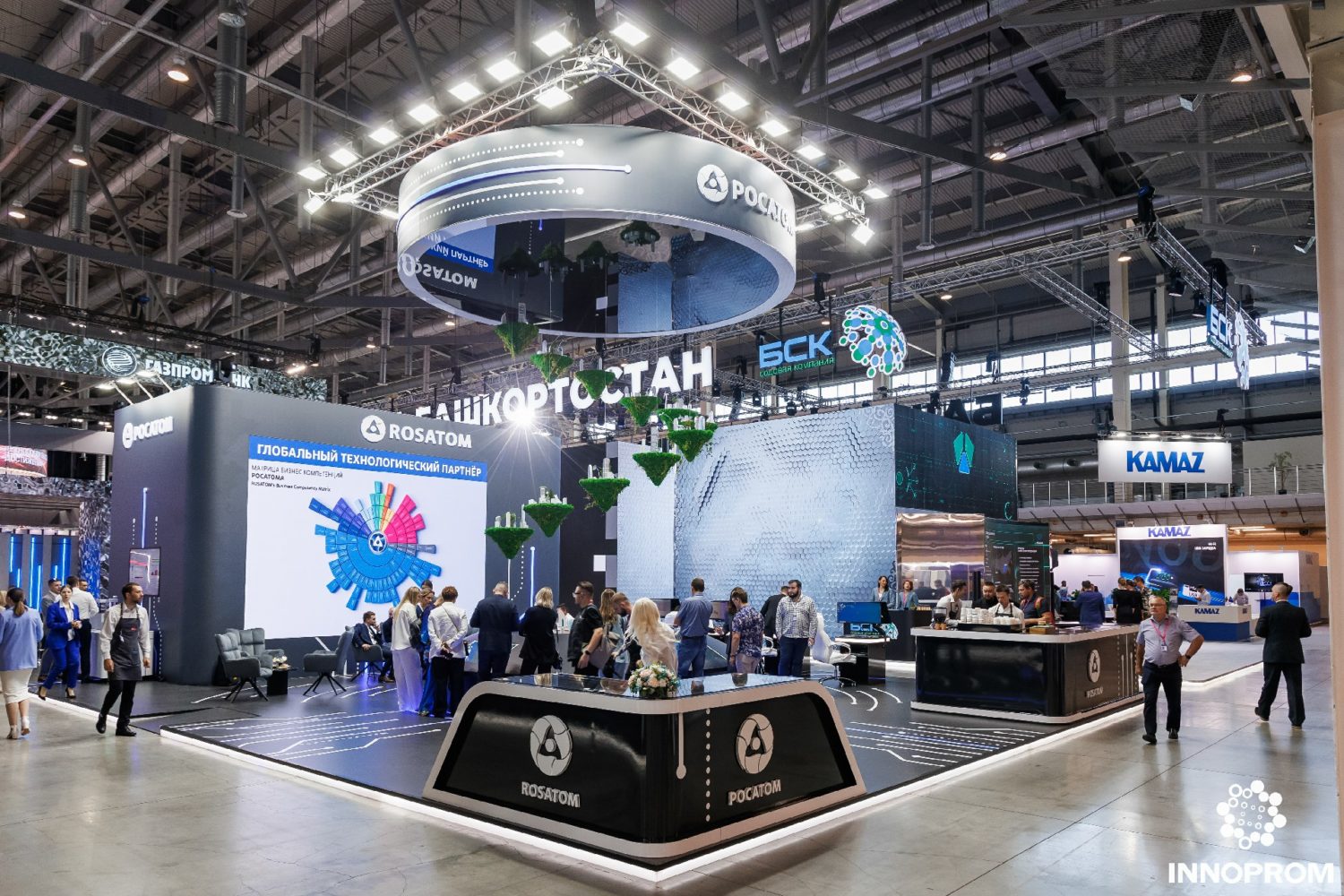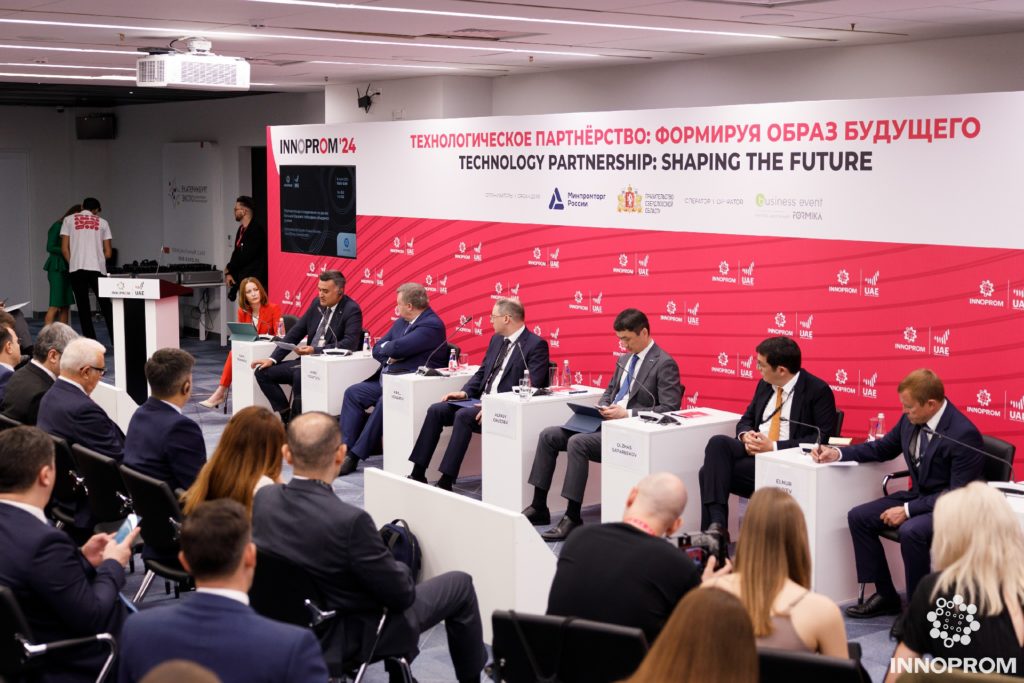
Greater Cooperation in Eurasia
back to contentsRosatom was one of the most notable participants of the Innoprom International Forum held in early July in Yekaterinburg. The session titled ‘Partnership for Promotion to the Markets of Greater Eurasia: We Win by Joining Forces’ discussed optimal partnership formats for the markets of this macro-region.
Through efforts of multiple companies
Kirill Komarov, First Deputy Director General for Corporate Development and International Business at Rosatom, spoke about the cooperation with local businesses in nuclear construction projects.
The average local content (locally sourced goods and services) in Rosatom’s international projects stands at around 30 % to 40 %, he emphasized. “Each nuclear power plant needs about 50 thousand articles of machinery and other products. No single company can produce the entire assortment. Our projects are an opportunity for industrial enterprises to receive huge high-tech, long-lead orders and make their contribution,” he said.

Over the past five years, Rosatom’s procurements from small and medium-sized businesses have doubled to reach an estimated RUB 550 billion this year. Each nuclear construction project creates 3 to 10 thousand jobs in the host country. This adds about USD 20–25 billion to the country’s GDP during both the construction phase and an almost century-long service life of the plant. “We are an engine for Russian technology in foreign markets, and we take care not only of ourselves but give numerous businesses a chance to earn big money. This is also a tremendous opportunity for them to make their production culture meet our strict requirements, to teach their employees, and to create high-tech competitive products. Only having set the bar high, on a par with international competitors, is it possible to be truly successful in our country,” Kirill Komarov expressed his confidence.
Evgeny Tugolukov, the founder of Medscan, gave an example of cooperation with Rosatom in the field of medicine. Rosatom acquired a 50 % stake in the company in two successive transactions. Evgeny Tugolukov compared the company to a dolphin that follows a whale and also helps it. According to the businessman, following the large company gives Medscan many opportunities and benefits as it can be the first to deploy nuclear medicine solutions developed by the Russian nuclear corporation. This does not mean, however, that one can sit back and do nothing. “There is a lot of hard work we are doing together, and it never ends. New opportunities are opening up, and they need effort,” Evgeny Tugolukov says.
Alexey Gruzdev, Deputy Minister of Industry and Trade of the Russian Federation, noted that globalization was giving way to regionalization (cooperation within regional associations), and Russia would use every opportunity provided by the SCO, EAEU and BRICS to establish mutually beneficial partnerships. For this purpose, the Russian Ministry of Industry and Trade is setting up a network of trade missions around the world. There are 59 of them, but additional accreditation allows Russia to be present in 78 countries. Seven trade missions were opened over the last three years, including five last year.
Russia’s economic interests extend beyond Greater Eurasia to Africa, Latin America and South East Asia, but trade is not the only thing in the focus of attention. Russia is setting up joint production facilities in favorably located industrial parks that offer special investment conditions. Such projects are currently in progress in Central Asia and the Caucasus. Joint funds are being established by stakeholders to co-finance projects. This practice will be expanded to cover other initiatives.
Russia also proposes to set up BRICS industrial competence centers to serve as best practice exchange and training platforms. The goal is to maximize the integration of supplier companies from the BRICS countries. The initiative is actively supported by the United Nations Industrial Development Organization (UNIDO).
Olzhas Saparbekov, Vice Minister of Industry and Construction of Kazakhstan, and Elnur Aliyev, First Deputy Minister of Economy of Azerbaijan, presented cross-country facilitation tools for commercial and industrial cooperation, such as special economic zones, industrial parks and investment funds. Ahmet Yozgatlıgil, Deputy Minister of Industry and Technology of Turkey, agreed that the countries of Greater Eurasia needed to improve trade and cooperation and said what opportunities Turkey could use for this purpose, emphasizing the unique geographical location of the country.
Summarizing the discussion at the session, Kirill Komarov noted that, for the partnerships to succeed, it was very important to understand each other’s interests and find a balance between them despite possible differences.
A look into the future
The visitors to Rosatom’s exhibition booth could take a look at the City of the Future art installation presenting nine promising business areas of the Russian nuclear corporation. These are green energy, environmental solutions, health technologies, logistics and transportation, resources and fuel, digital solutions, new technologies and materials, science and innovation, and education. The booth also featured a simulated production line powered with AtomMind, Rosatom’s predictive analytics system.
Innoprom has been held annually in Yekaterinburg since 2010. As a partner of Innoprom 2024, the United Arab Emirates sent about 200 people to the forum, including ministers of industry, foreign trade, public education and advanced technologies.




